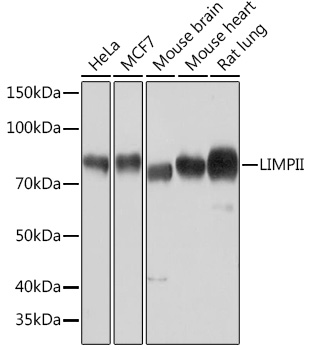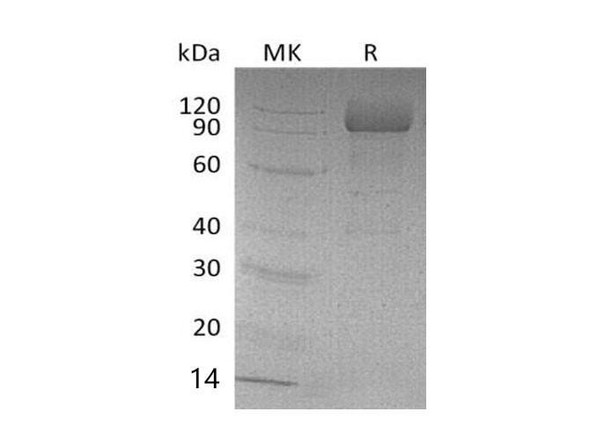Immunology Antibodies 3
Anti-LIMPII Antibody (CAB9185)
- SKU:
- CAB9185
- Product Type:
- Antibody
- Reactivity:
- Human
- Reactivity:
- Mouse
- Reactivity:
- Rat
- Host Species:
- Rabbit
- Isotype:
- IgG
- Antibody Type:
- Monoclonal Antibody
- Research Area:
- Immunology
Description
| Antibody Name: | Anti-LIMPII Antibody |
| Antibody SKU: | CAB9185 |
| Antibody Size: | 20uL, 50uL, 100uL |
| Application: | WB IHC |
| Reactivity: | Human, Mouse, Rat |
| Host Species: | Rabbit |
| Immunogen: | A synthesized peptide derived from human LIMPII |
| Application: | WB IHC |
| Recommended Dilution: | WB 1:500 - 1:2000 IHC 1:50 - 1:200 |
| Reactivity: | Human, Mouse, Rat |
| Positive Samples: | HeLa, MCF7, Mouse brain, Mouse heart, Rat lung |
| Immunogen: | A synthesized peptide derived from human LIMPII |
| Purification Method: | Affinity purification |
| Storage Buffer: | Store at -20'C. Avoid freeze / thaw cycles. Buffer: PBS with 0.02% sodium azide, 0.05% BSA, 50% glycerol, pH7.3. |
| Isotype: | IgG |
| Sequence: | Email for sequence |
| Gene ID: | 950 |
| Uniprot: | Q14108 |
| Cellular Location: | |
| Calculated MW: | 77kDa |
| Observed MW: | 75KDa |
| Synonyms: | AMRF, CD36L2, EPM4, HLGP85, LGP85, LIMP-2, LIMPII, SR-BII |
| Background: | The protein encoded by this gene is a type III glycoprotein that is located primarily in limiting membranes of lysosomes and endosomes. Earlier studies in mice and rat suggested that this protein may participate in membrane transportation and the reorganization of endosomal/lysosomal compartment. The protein deficiency in mice was reported to impair cell membrane transport processes and cause pelvic junction obstruction, deafness, and peripheral neuropathy. Further studies in human showed that this protein is a ubiquitously expressed protein and that it is involved in the pathogenesis of HFMD (hand, foot, and mouth disease) caused by enterovirus-71 and possibly by coxsackievirus A16. Mutations in this gene caused an autosomal recessive progressive myoclonic epilepsy-4 (EPM4), also known as action myoclonus-renal failure syndrome (AMRF). Alternatively spliced transcript variants encoding different isoforms have been found for this gene.[provided by RefSeq, Feb 2011] |
| UniProt Protein Function: | SCARB2: Acts as a lysosomal receptor for glucosylceramidase (GBA) targeting. Defects in SCARB2 are the cause of progressive myoclonic epilepsy type 4 with or without renal failure (EPM4). An autosomal recessive progressive myoclonic epilepsy associated with renal failure in some cases. Cognitive function is preserved. Myoclonus is a brief, involuntary twitching of a muscle or a group of muscles. Cognitive function is preserved. Genetic variants in SCARB2 can act as modifier of the phenotypic expression and severity of Gaucher disease. Belongs to the CD36 family. |
| UniProt Protein Details: | Protein type:Receptor, misc.; Membrane protein, integral; Membrane protein, multi-pass Chromosomal Location of Human Ortholog: 4q21.1 Cellular Component: lysosomal lumen; focal adhesion; membrane; lysosomal membrane; integral to membrane Molecular Function:protein binding; enzyme binding; receptor activity Biological Process: protein targeting to lysosome; cell adhesion Disease: Epilepsy, Progressive Myoclonic 4, With Or Without Renal Failure |
| NCBI Summary: | The protein encoded by this gene is a type III glycoprotein that is located primarily in limiting membranes of lysosomes and endosomes. Earlier studies in mice and rat suggested that this protein may participate in membrane transportation and the reorganization of endosomal/lysosomal compartment. The protein deficiency in mice was reported to impair cell membrane transport processes and cause pelvic junction obstruction, deafness, and peripheral neuropathy. Further studies in human showed that this protein is a ubiquitously expressed protein and that it is involved in the pathogenesis of HFMD (hand, foot, and mouth disease) caused by enterovirus-71 and possibly by coxsackievirus A16. Mutations in this gene caused an autosomal recessive progressive myoclonic epilepsy-4 (EPM4), also known as action myoclonus-renal failure syndrome (AMRF). Alternatively spliced transcript variants encoding different isoforms have been found for this gene.[provided by RefSeq, Feb 2011] |
| UniProt Code: | Q14108 |
| NCBI GenInfo Identifier: | 2498525 |
| NCBI Gene ID: | 950 |
| NCBI Accession: | Q14108.2 |
| UniProt Secondary Accession: | Q14108,O35114, P27615, |
| UniProt Related Accession: | Q14108 |
| Molecular Weight: | 54,290 Da |
| NCBI Full Name: | Lysosome membrane protein 2 |
| NCBI Synonym Full Names: | scavenger receptor class B, member 2 |
| NCBI Official Symbol: | SCARB2 |
| NCBI Official Synonym Symbols: | AMRF; EPM4; LGP85; CD36L2; HLGP85; LIMP-2; LIMPII; SR-BII |
| NCBI Protein Information: | lysosome membrane protein 2; LIMP II; CD36 antigen-like 2; lysosome membrane protein II; 85 kDa lysosomal membrane sialoglycoprotein; 85 kDa lysosomal sialoglycoprotein scavenger receptor class B, member 2; CD36 antigen (collagen type I receptor, thrombos |
| UniProt Protein Name: | Lysosome membrane protein 2 |
| UniProt Synonym Protein Names: | 85 kDa lysosomal membrane sialoglycoprotein; LGP85; CD36 antigen-like 2; Lysosome membrane protein II; LIMP II; Scavenger receptor class B member 2 |
| Protein Family: | Platelet glycoprotein |
| UniProt Gene Name: | SCARB2 |
| UniProt Entry Name: | SCRB2_HUMAN |
View AllClose







